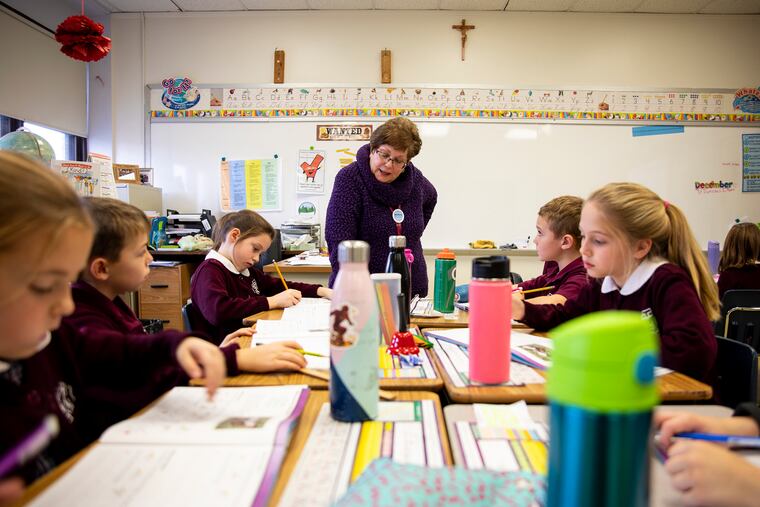Pennsylvania’s Catholic schools face uncertainty in pandemic era | Opinion
St. Basil Academy, an all-girls high school in Jenkintown, announced this month it will close at the end of the school year, exemplifying an unfortunate trend.

When Apryl and James Dolgas enrolled their sons, Brady and Alec, in Catholic schools, they anticipated financial hardship. Though tuition at Johnstown’s Divine Mercy Academy and Bishop McCort High School is less than half what their local school district spends per pupil, it was still costly.
But Apryl and James believed the financial sacrifice was worth it — especially since the Greater Johnstown School District, Apryl’s alma mater, consistently ranks near the bottom of districts statewide. The COVID-19 pandemic proved the wisdom of their decision. In March, when Gov. Tom Wolf mandated in-person school closures, Divine Mercy and Bishop McCort immediately pivoted to remote instruction. According to Tom Smith, chief academic officer at Divine Mercy and principal of Bishop McCort, those schools missed just one day of classes for teacher in-service.
» READ MORE: Philly-area Catholic high school teachers approve a new contract
This was the case throughout Pennsylvania. Catholic schools weren’t caught flat-footed like many districts were because they’d taken advantage of a state program to plan up to five “flexible instruction days” in a school year. Having the first week planned gave them a head start when the school closures were announced. Only 72 of the state’s 500 public school districts participated in the program.
Apryl and James were thankful for the limited academic disruption at their sons' schools. Though learning online, their children maintained a rigorous schedule without busy work. Teachers also accommodated parents' scheduling challenges, and some even offered evening classes so parents could participate with their children.
In a shutdown-induced economic downturn, however, many can’t afford private school tuition, and the donations that kept Catholic schools afloat are dropping off. About 150 Catholic schools nationwide have closed permanently this year, according to the National Catholic Education Association.
St. Basil Academy, an all-girls high school in Jenkintown founded in 1931, exemplifies this unfortunate trend. This month, St. Basil announced it will close at the end of the school year. The pandemic undoubtedly fueled the sad outcome, but St. Basil was already struggling to compete with “free” public schools, which enjoy a significant financial advantage.
In many cases, families would prefer to keep their children in Catholic schools. Though the Dolgas family tightened their belts to pay tuition, many cash-strapped parents have no choice but to transfer their children to ZIP-code assigned schools. This dilemma is why parents like Apryl and James support legislative measures that would focus on students rather than propping up the district-controlled system.
After all, people are already permitted to use government funds at private — even religious — preschools, day-care centers, or colleges. COVID-19 relief funds weren’t denied to other entities because of private or religious status, yet when it comes to K-12 education funding, families who choose a private school are left out.
» READ MORE: The future of public education will be decided in the 2020 election | Opinion
For example, in Pennsylvania, unions and their public school allies are fighting proposed Back on Track education grants, which would allocate some federal COVID-19 relief funds to lower-income parents struggling with increased education costs. In August, the Pennsylvania State Education Association president said the union would “absolutely” support giving funds to help families with new, unforeseen expenses in the COVID-19 era. “Any assistance that we can give those folks so their children can be successful would be important to have,” he said — but since private school students are also eligible, the union is now fighting the proposal.
Nobody benefits from education tribalism. Lawmakers should use federal relief funds to make life easier for Catholic school families trying to make ends meet.
Apryl and James Dolgas feel fortunate their sons can attend Divine Mercy and Bishop McCort, which continue to operate during these uncertain times. Sadly, St. Basil Academy faces a different outcome. Catholic schools play a vital role in Pennsylvania communities. That’s why lawmakers should empower parents to select the school that is right for their children, which will help these essential schools survive the pandemic — and ensure more children have access to the school that is best for them.
Colleen Hroncich is senior policy analyst at the Commonwealth Foundation. This piece originally appeared in RealClearPolitics.